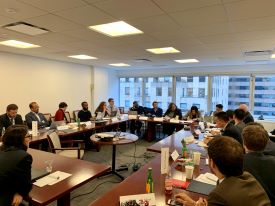- This event has passed.
The 2018-2020 cohort of the Social Science Research Council’s (SSRC) China-Africa Peace Fellowship met for a second time for a research and writing workshop in New York. The first day of the workshop, (18 November 2019) served as an opportunity for Fellows to workshop and refine first drafts of their research papers through a collaborative exchange of ideas with Program Director Tatiana Carayannis, and a small group of invited scholars working on their topics.
The SSRC’s China-Africa Peace Fellows received training and research support to travel to five field-work sites (Juba, South Sudan, Addis Ababa, Ethiopia, Monrovia, Liberia, and Johannesburg, South Africa) throughout the summer of 2019. Fellows were matched with host institutions across the African continent and were integrated into platforms of scholarly exchange with African scholars, human right activists, and expert practitioners in their region, which helped expand their understanding of issues of global inequality and the impact of China’s engagement with multilateralism and with the African continent. One Fellow observed the ways in which her positionality as an independent Chinese academic researcher surfaced as she moved across her different research sites.
In research site 1, the Fellow explains, “I was warm-welcomed and was able to conduct a lot of well-organized data. When I switched to research site 2, I met great resistance from the Chinese community that did not automatically trust the scientific and academic integrity of my research and targeted me with great suspicion. These tensions in the fieldwork restricted my research access significantly.”
The project has also exposed our research Fellows first-hand to the lived realities of African communities with the aim to work towards approaches to sustaining peace that are better adapted to the needs of these countries.
Upon returning from the field one Fellow highlighted a new sense of understanding of the term “soft power” and remarked, “Instead of inserting our understanding of soft power and seeing whether it’s operable, we have to rethink and get the idea and new ideas from the field from the local people’s own understanding. The Chinese emphasize mutual understanding, but we are reluctant to present ourselves as powerful and impactful even though we are yielding significant power over local people’s lives.”
On Tuesday, 19 November, at the Security Council Report in New York, Fellows presented their research findings to an academic, diplomatic, NGO, and UN policy audience and participated in a conversation with the audience on China’s contributions to global peace practice. Dr. Carayannis introduced the program and the fellows. Dr. Lina Benabdallah of Wake Forest University, an expert on China’s foreign policy, served as moderator for the Fellows’ presentations where Fellows shared emerging views on global peace practice, noting various themes such as the role of regional powers in peacekeeping and international peacekeeping norms, to the role of infrastructure initiatives and philanthropy. Fellows also received insightful feedback from invited scholars, NY-based think tanks, and peace practitioners on their projects. Dr. Duncan Omanga, Program Officer for the SSRC’s African Peacebuilding Network and Next Generation Social Sciences Africa moderated the conversation on China’s contributions to global peace practice. Dr. Benadbdallah and Dr. Xue Lei of the Shanghai Institute for International Studies shared their assessments of China’s growing leadership in the UN, and the potential challenges and possibilities for sustaining peace and multilateral cooperation.
African host institutions are core to the project. The mutual trust created through these relationships will facilitate a necessary dialogue between Chinese and African scholars at the research and policy workshops planned during a conference in Beijing in Spring 2020. The research conference will facilitate a broader dialogue in the Chinese scholarly community about field research methods and evidence-based scholarship. The workshop will also be open to advanced graduate students and interested faculty and will discuss challenges, best practices, and recommendations for conducting effective field research in conflict-affected regions. Panelists will share their experiences in data collection, data security, and data analysis, and discuss questions about the ethics of doing field research and international research collaborations.
Fellows have been invited to submit their research papers to the World Economics and Politics Journal at Peking University. In addition, Fellows will be publishing English research briefs which will be published on the SSRC website.
With support from the Ford Foundation, the China-Africa Peace Fellowship strengthens the evidentiary basis for Chinese scholarship on the UN and multilateral cooperation, fosters greater South-South dialogue and promotes knowledge exchange between African and Chinese scholars, and integrates African and Chinese perspective into key policy debates within the UN. The China-Africa Peace Fellowship is emblematic of the Social Science Research Council’s longstandingcommitment to enhance international research collaborations and to produce knowledge for the public good. Our partners in this research fellowship include the Centre for Dialogue, Research, and Cooperation in Addis Ababa, Ethiopia; The Kofi Annan Institute for Conflict Transformation at the University of Liberia; The South African Institute for International Affairs in Johannesburg; The University of Dar es Salaam; The Institute for Peace, Development, and Security Studies at the University of Juba (South Sudan), Chinese Peacekeeping Police Training Centre; and Peking University.


 Events
Events